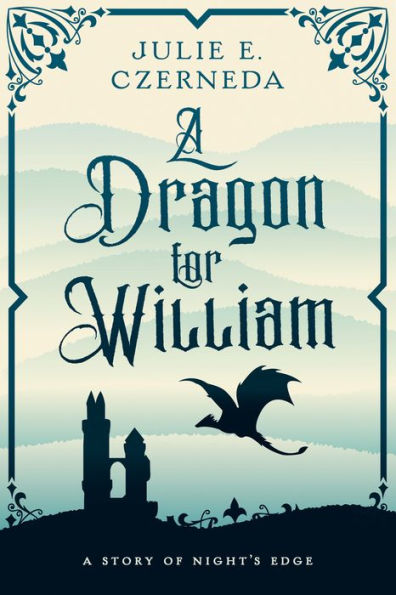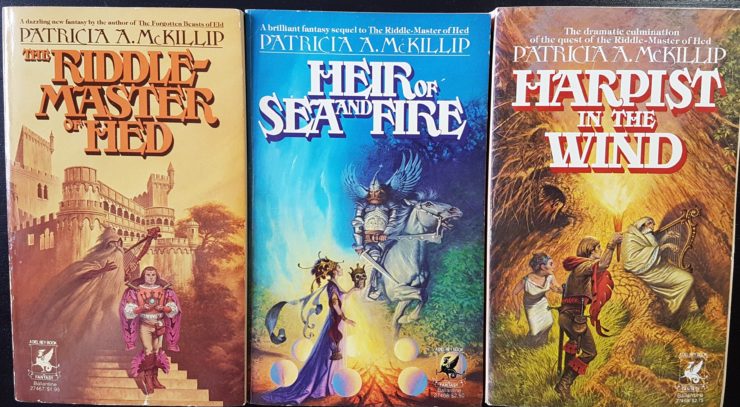I met The Riddlemaster of Hed in the fall of 1978, in Saskatoon, Saskatchewan, during my grad studies in biology. The author, Patricia McKillip, I’d encountered in an undergrad course in fantasy; her book, The Forgotten Beasts of Eld, was by far my favorite from that reading list, so I’d kept my eye out for more. I pounced on the mass market, the one pictured above, at the university bookstore. The Heir of Sea and Fire was there too, but it would take another year before I’d have the finale, Harpist in the Wind, in my hands. The books follow Morgon, the Prince of Hed, a humble little country, on his quest to discover the meaning of the stars embedded in his forehead and what happened to his parents, killed at sea. He is a riddlemaster, a scholar trained to use the hints and partial revelations of history to uncover the truth. His first success in a battle of riddles and wits wins him a dead king’s crown and the hand of Raederle, herself descended from shapechanging sorcerers. As Morgon and Raederle, helped by the High One’s Harpist, chase their personal mysteries, the answers disturb those long buried underground, renewing a war from the beginnings of time. To keep the peace and safe their world, they will need to solve the most terrifying riddle of all: why?
What was awesome about McKillip’s story? It marked the first time I refused to read the new one, in my hands, without rereading the previous book(s) first, a habit I’ve continued to this day, with any story I love this much. It’s not because I forget details as years pass. I don’t, not really. I think it’s to put off the moment I finish the new one. To linger, longer, in worlds I’ve grown to value, before the moment when yes, it’s done and I must leave again.
This is me as a reader: sentimental, passionate. possessive. Eager to share; at the same time, timid, because what if you don’t love what I do, as I do? It can’t diminish the work I love—not to me—but I’ll admit to disappointment. It makes me more timid, less eager, next time I try.
Had I discovered fandom, those long years ago, I might have plunged in with glee, safe among my people, able to load friends up with books dear to my heart. But in 1978, I knew no one who read what I did.
Or who wrote.
Oh yes. I wrote back then. Science fiction. Twenty-three novels underway, just for me. (It would be another decade before I considered sharing those, and even then I’d had some encouragement or they’d likely still be in a drawer.)
I didn’t write fantasy, though I loved reading it. Until The Riddlemaster of Hed, I simply didn’t see where I’d, well, fit. I knew what I liked, loved, loathed. (I’d yet to learn I didn’t have to finish every book I started. Trust me, you don’t, and it’s liberating).
Every couple of years, I’d reread The Riddlemaster of Hed, as enchanted as I’d been the first time, gleaning more every time, because McKillip is like that. She scatters gems like this in her work:
The sky was clear before dawn; the stars, huge, cold, gave him light. In the distance tiny lights from farmhouses winked alive, golden eyes in the darkness. The fields of the city gave way to a plain where huge stones rose originless as wizards around him.
Everything, every word matters. McKillip’s simplicity is deceptive. There isn’t a phrase or paragraph that doesn’t inform the story and world, yet never is she overt. Her skill with words is, and was, breathtaking.
Back then, McKillip’s words convinced me I’d probably never write fantasy. I love words used well. I love elegance paired with subtlety. The fantasy that matters most to me has a vocabulary of its own, a deep, unique cadence. Impossible, delicious, yet ordinary words. I’d no problem “talking” science fiction and far future and odd biology. Finding my voice in fantasy?
Not happening.
Or so I thought, then.
There was something else awesome, and refreshing, about The Riddlemaster of Hed. There are families. Morgon of Hed, the titular character, has a sister and brother. Raederle has a brother and a father—who is occasionally a crow. There are friendships and loves and histories galore, present and past, all completely credible, many deeply moving, and some pivotal.
When Morgon’s younger sister Tristan asks him for cloth and needles and shoes, he responds with:
“What…do you think grows in our fields?”
“I know what grows in our fields. I also know what I’ve been sweeping around under your bed for six months. I think you should either wear it or sell it. The dust is so thick on it you can’t even see the colors of the jewels.”
Morgon, you see, won a riddle contest with a dead king and brought home his crown. Then tucked it under his bed, because Hed isn’t a place for crowns, being small and pastoral. There are pigs.
He also unknowingly “won” something else. Raederle.
“…I don’t understand.”
“The King made a vow at her birth to give her only to the man who took the crown of Aum from Peven.”
“…What a stupid thing for him to do, promising Raederle to any man with enough brains…”
Another awesome thing about McKillip? Her protagonists are sensible, kind, respectful people. They may, like Raederle and Morgon, have incredible abilities, but that isn’t what draws you to them. It’s that they care. For one another, but also for the land. It’s a theme throughout the story. Leaders are literally connected to the land they rule. I won’t spoil the story for you, but must share this:
Morgon has asked a ruler for her knowledge, to learn the power of her land-law.
Some thought was growing behind her eyes. Standing so quietly, still gripping him, she could not speak. He felt as if he were changing shape in front of her into something as ancient as the world around which riddles and legends and the colors of night and dawn clung like priceless, forgotten treasures.
Shape changing. The wind. Stone, destiny, and the unuttered secrets of the past. Deth, the High One’s Harpist and Morgon’s guide, changes his shape profoundly during the story, yet never changes at all. Morgon and Raederle journey apart and together, finding their own path and purpose. It’s an astonishing, invigorating, lovely read.
Buy the Book


A Dragon for William
You’re probably wondering how I ever dared write fantasy of my own, having a work like this for my standard.
It was the sour milk.
Tristen stops her brothers’ scuffle over the crown by dumping sour milk meant for the pigs over their heads. The juxtaposition of mystery, magic, and ordinary.
I hadn’t read anything to give me the same joy since I was much younger, when wardrobes could be doorways, toys came alive, and tiny people might live inside flowers. Thinking about it now, another factor making McKillip’s work strike a chord as that I’d entered the time of life when family urgently matters. The loss of those dear to me. Starting our own, with the staggering revelation of how much love a heart could hold. How could I not resonate to the jaw-dropping wonder of the secrets informing the Riddlemaster’s world, when they were told within such a real family, living life.
That, I realized, was the kind of fantasy I wanted to write. On Sept 30, 2002, I started what would become A Turn of Light. Notes. Thoughts. Mutterings to myself. Details of family. Ponderings of deep, wild magic. It took me years to find the voice, build the cadence, create the vocabulary I needed. I’m still, by the way, working on those, but along the way I’ve written three fantasy novels I love, and will write more.
The Riddlemaster of Hed has let me.
Thank you, Patricia McKillip. That was awesome.
Julie E. Czerneda is the author of the Species Imperative trilogy, the Night’s Edge fantasy duology, and the Stratification novels. She is a multiple Aurora Award winner, and was a finalist for the John W. Campbell Award and the Philip K. Dick Award. Her latest work, A Dragon for William, publishes December 3rd with DAW.










